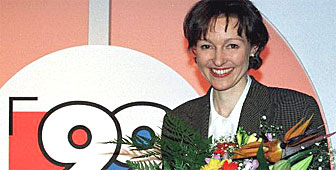Patrizia Pesenti: Ticino is not a special case

Patrizia Pesenti - only the second woman ever to be elected to canton Ticino's government - has responsibility for the Department of Social Affairs. Pesenti, a member of the Social Democratic party, has a strong interest in family and health issues.
After graduating in law from Zurich University, she worked for 14 years as a juvenile court judge before her election in 1999 to the Ticinese government.
“There have always been at least two myths associated with Ticino. According to one, we’re basically warm-hearted, sociable and creative people, living on Switzerland’s sun-drenched southern terrace.
The second depicts us as a people beset with weaknesses, laziness, a lack of scruples and a tendency towards intrigue. We all know that myths of this kind are very stubborn, they’re hard to shift.
Every attempt to force Ticino into one of these categories distances it from Switzerland as a whole and turns it into a special case. But Ticino isn’t a special case. The truth is that Ticino – like the rest of Switzerland – is undergoing change, and the reality is too complex, too unpredictable to lend itself to unambiguous definition.
Ticino isn’t a special case, and neither for that matter is Switzerland.
History – if we interpret it carefully and are not side-tracked by myths – tells us that in Ticino, as in the rest of Switzerland, we’ve managed to achieve a high quality of life and independence not because we’re a special case, but because we’ve worked hard. We’ve worked hard to achieve harmony between different ideologies, different interests and different language regions.
This has been achieved thanks to the continuous attention paid to the living standards of our citizens. The generations before us made it a priority to raise people’s standard of living, not just in terms of immediate material progress, but by paying due regard to schooling, health and social welfare.
For many years, the Swiss government has understood that, in a country lacking natural resources, the wisest course is to concentrate on developing its human capital.
This sensitivity to the need to educate our citizens to a high level is deeply rooted in our history. Switzerland has a centuries-old tradition of educational research (the names of Rousseau, Pestalozzi or Piaget immediately spring to mind).
The same is true in the field of public health; it was Switzerland which enthusiastically promoted the most humanitarian of all the world’s health institutions: the Red Cross.
Some years ago, the historian Jean-François Bergier wrote: “The human being has always been the yardstick of Swiss society – a society consisting of restricted, tight-knit communities in which every head and every pair of hands had a function to perform. The idea is of a nation founded on free-will, a free-will that needs educating”. This is the Switzerland with which I can readily identify – the Switzerland that is the result of a great moral, humanist and humanitarian tradition.
And what about Ticino? Ticino has always recognised itself as part of this tradition, sometimes setting the pace, at other times carried along by the rest of Switzerland.
It has suffered on account of its fragility – like a person who has had to take their first steps in conditions of poverty and dependence – but has also shown the enthusiasm of someone who is determined to go far.”
Patrizia Pesenti

In compliance with the JTI standards
More: SWI swissinfo.ch certified by the Journalism Trust Initiative
You can find an overview of ongoing debates with our journalists here . Please join us!
If you want to start a conversation about a topic raised in this article or want to report factual errors, email us at english@swissinfo.ch.